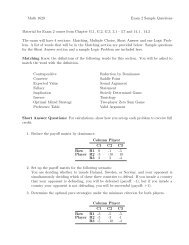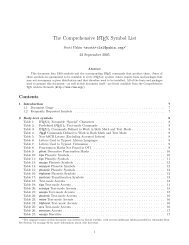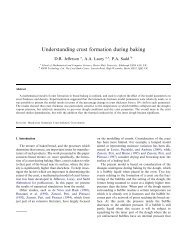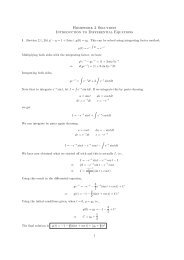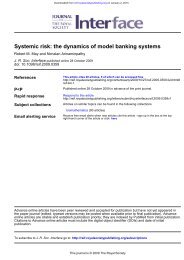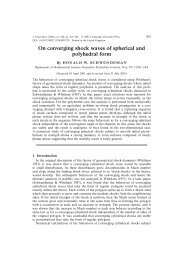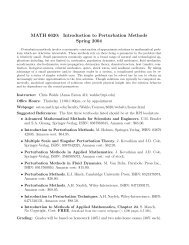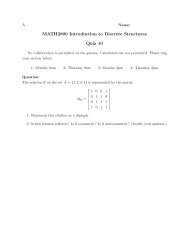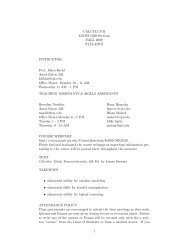ILOG CPLEX C++ API 9.0 Reference Manual
ILOG CPLEX C++ API 9.0 Reference Manual
ILOG CPLEX C++ API 9.0 Reference Manual
You also want an ePaper? Increase the reach of your titles
YUMPU automatically turns print PDFs into web optimized ePapers that Google loves.
IloCplex<br />
Attempts to find a feasible relaxation of an active model by relaxing the bounds of the<br />
constraints specified in rngs as specified in rnglb and rngub. This is a special<br />
version of the method feasOpt(IloRangeArray, IloNumArray,<br />
IloNumArray, IloNumVarArray, IloNumArray, IloNumArray,<br />
IloBool)<br />
The method returns IloTrue if a feasible relaxation is found along with a solution<br />
for it.<br />
public IloBool feasOpt(const IloNumVarArray vars,<br />
IloNumArray varlb,<br />
IloNumArray varub,<br />
IloBool optimize)<br />
Attempts to find a feasible relaxation of an active model by relaxing the bounds of the<br />
variables specified in vars as specified in varlb and varub. This is a special version<br />
of the method feasOpt(IloRangeArray, IloNumArray, IloNumArray,<br />
IloNumVarArray, IloNumArray, IloNumArray, IloBool)<br />
The method returns IloTrue if a feasible relaxation is found, along with a solution<br />
for it.<br />
public IloBool feasOpt(const IloRangeArray rngs,<br />
IloNumArray rnglb,<br />
IloNumArray rngub,<br />
const IloNumVarArray vars,<br />
IloNumArray varlb,<br />
IloNumArray varub,<br />
IloBool optimize)<br />
The method feasOpt computes a minimal relaxation of the bounds of variables and<br />
constraints that make the active model feasible. For each bound, the user may specify a<br />
preferred value indicating how much a relaxation of that bound is acceptable. A<br />
negative or 0 (zero) value indicates that the corresponding bound must not be relaxed.<br />
Typically, values greater than or equal to 1 (one) should be used. The preference value<br />
for relaxing the lower and upper bound of constraint rngs[i] must be provided in<br />
rnglb[i] and rngub[i], respectively. Similarly, the preference value for relaxing<br />
the lower and upper bound of constraint vars[i] must be provided in varlb[i] and<br />
varub[i], respectively.<br />
If enough variables or constraints were allowed to be relaxed, the function will return<br />
IloTrue and IloFalse otherwise. In case of success, the routine returns with<br />
suggested relaxed values that would make the active model feasible. These bounds are<br />
chosen in such a way that the relaxation is minimal in the sense that the sum of<br />
(relaxation amount)/(preference value) over all variables and constraints is minimized.<br />
The bounds that make the model feasible are returned in the same arrays as the<br />
preference values are passed into this method. That is, after successfull termination of<br />
the method feasOpt, rnglb[i] and rngub[i] contain the lower and upper bound<br />
<strong>ILOG</strong> <strong>CPLEX</strong> <strong>C++</strong> <strong>API</strong> <strong>9.0</strong> REFERENCE M ANUAL 57



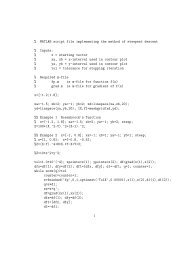
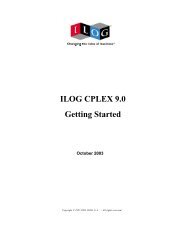
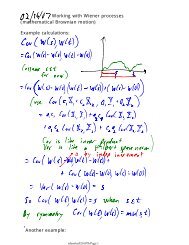

![MATH 1500 Sample Questions Exam 2 1. [3.7] A 10-ft plank is ...](https://img.yumpu.com/43861920/1/190x245/math-1500-sample-questions-exam-2-1-37-a-10-ft-plank-is-.jpg?quality=85)
